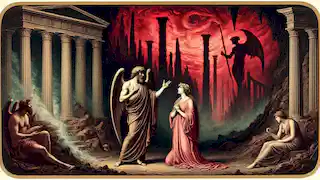The Myth of Sisyphus
Reading Time: 12 min

About Story: The Myth of Sisyphus is a Myth from greece set in the Ancient. This Dramatic tale explores themes of Perseverance and is suitable for All Ages. It offers Cultural insights. The eternal struggle of a king who dared defy the gods. .
In the land of ancient Greece, where the gods ruled from Mount Olympus and heroes like Hercules and Achilles roamed the earth, there lived a man whose name became synonymous with cunning, deceit, and ultimately, endless toil. This was Sisyphus, the king of Ephyra, a man renowned for his cleverness and skill, but equally for his audacious attempts to defy the gods themselves.
Sisyphus’s story is one of both brilliance and downfall, a powerful myth that illustrates the inescapable consequences of arrogance and hubris in the face of divine power. He was a man who believed he could outsmart death itself, a feat that no mortal had ever achieved and that the gods could not allow. His eternal punishment, to roll a massive boulder up a hill only for it to roll back down just as he reached the summit, has become one of the most enduring symbols in all of mythology, representing the futility of endless labor and the relentless struggle against forces greater than oneself.
This myth, retold through the ages, is not just a story of punishment but a reflection on the human condition. Sisyphus, in his ceaseless effort, becomes a symbol for the eternal struggle of mankind, to seek meaning, to resist despair, and to fight against overwhelming odds. In the end, the myth of Sisyphus resonates as much with philosophy as it does with myth, asking questions about existence, fate, and the limits of human endeavor. Sisyphus was born to Aeolus, the ruler of Thessaly, and Enarete, a woman of noble birth. His lineage granted him great power and influence, and from a young age, it was clear that Sisyphus possessed an extraordinary mind. He was clever, shrewd, and capable of devising strategies that would outwit his enemies and secure his dominance in the Greek world. He rose to power as the king of Ephyra, a city later known as Corinth, one of the most important city-states in ancient Greece. Under his reign, Ephyra became a thriving center of commerce and trade. Sisyphus fortified the city, built formidable walls, and created alliances that made Ephyra a powerful and wealthy city-state. However, despite his successes as a ruler, Sisyphus was far from a benevolent leader. He was notorious for his deceitful nature and his willingness to betray others to serve his own interests. Sisyphus was known to break oaths, lie, and manipulate both friend and foe to achieve his goals. He exploited his position of power to increase his wealth and secure his legacy, often at the expense of others. But Sisyphus’s greatest offense was not against his fellow mortals but against the gods themselves. In a world where the gods governed the fate of all men, Sisyphus dared to challenge their authority. This was a transgression that would ultimately lead to his downfall. Sisyphus’s most audacious act of treachery occurred when he revealed one of Zeus’s closely guarded secrets. Zeus, the king of the gods, had abducted Aegina, the daughter of the river god Asopus. The mighty Zeus had hidden Aegina away, seeking to keep her for himself, as he often did with the many women he desired. When Asopus searched desperately for his daughter, it was Sisyphus who approached him with an offer. Sisyphus had seen Zeus take Aegina, and he knew her whereabouts. In exchange for revealing this information, Sisyphus asked Asopus to provide fresh water for the springs of Ephyra, which were suffering from drought. Desperate to find his daughter, Asopus agreed to the bargain, and Sisyphus told him where to find Aegina. This act of betrayal did not go unnoticed. Zeus, enraged by Sisyphus’s treachery, vowed that the cunning king would pay dearly for his insolence. Revealing the secrets of the gods was an unforgivable crime, and Zeus was determined to punish Sisyphus for his arrogance. Zeus called upon Thanatos, the god of death, to claim Sisyphus and bring him to the underworld, where he would face his punishment. Thanatos was a grim and relentless figure, tasked with escorting the souls of the dead to Hades. He wielded chains that bound the spirits of the deceased, ensuring that they could not escape their final fate. Thanatos appeared at Sisyphus’s palace, ready to claim the king’s soul. However, Sisyphus had anticipated this visit and had devised a plan to outsmart death itself. He greeted Thanatos with false hospitality, pretending to welcome the god into his home with respect and deference. During a lavish feast, Sisyphus engaged Thanatos in conversation, flattering him and showing great interest in the chains he carried. Thanatos, unsuspecting of Sisyphus’s true intentions, allowed the king to examine the chains more closely. In that moment, Sisyphus acted quickly and decisively. He overpowered Thanatos and bound the god of death in his own chains, imprisoning him within his palace. With Thanatos bound, death itself was rendered powerless. No mortal could die, and the natural order of the world was thrown into chaos. Soldiers wounded in battle lay writhing in pain but could not die. The elderly, the sick, and the suffering were trapped in their bodies, unable to pass on to the afterlife. Even the gods took notice of this strange and unnatural state of affairs. While Sisyphus reveled in his temporary victory over death, the world outside his palace was in turmoil. The natural balance of life and death had been disrupted, and the consequences were dire. War continued without end, for no soldier could fall. Sickness lingered indefinitely, causing immense suffering. The gods themselves grew restless, for they too relied on the natural cycle of death to maintain order in the universe. Ares, the god of war, was the first to intervene. Furious that the cycle of battle had been broken, he descended from Olympus to confront Sisyphus. The god of war was a fearsome and violent deity, and he had little patience for Sisyphus’s clever tricks. With his immense strength, Ares stormed Sisyphus’s palace and shattered the chains that bound Thanatos, freeing the god of death from his imprisonment. Once freed, Thanatos wasted no time in reclaiming the souls that had eluded him. Death resumed its rightful place in the world, and those who had been trapped in eternal suffering were finally allowed to pass on to the afterlife. But Sisyphus had not escaped Thanatos’s wrath. This time, the god of death bound the cunning king in unbreakable chains and dragged him to the underworld, where he would face judgment for his crimes. Sisyphus was brought before Hades and Persephone, the rulers of the underworld. Hades, the god of the dead, was not known for his mercy, and he intended to sentence Sisyphus to eternal punishment for his arrogance and deceit. However, even in the face of divine judgment, Sisyphus’s mind was still working on a way to escape his fate. Before Hades could pass his sentence, Sisyphus made a bold appeal to Persephone, the queen of the underworld. He told her that his wife, Merope, had not performed the proper funeral rites for him after his death. According to Greek tradition, it was essential for the living to honor the dead with offerings and rituals, ensuring that the deceased’s soul could find peace in the afterlife. Feigning outrage, Sisyphus claimed that Merope had dishonored him by neglecting these sacred duties. He argued that it would be unjust for him to remain in the underworld while his soul had not been properly honored. He begged Persephone to allow him to return to the world of the living for a brief time, so that he could ensure the funeral rites were carried out correctly. Persephone, moved by Sisyphus’s plea, granted him permission to return to the surface for a short time. She believed that he would return to the underworld once the rituals were completed, unaware that Sisyphus had no intention of ever coming back. Sisyphus, now free once again, returned to the world of the living. However, rather than fulfilling his promise to Persephone, he resumed his life as if nothing had happened. He continued to rule over Ephyra, indulging in the pleasures of life and enjoying his newfound freedom. Sisyphus believed that he had once again outwitted the gods, that he had cheated death and escaped his fate. But the gods were not so easily deceived. Zeus, furious that Sisyphus had defied them once more, ordered Hermes, the swift-footed messenger of the gods, to retrieve the king and bring him back to the underworld. This time, there would be no more tricks, no more clever schemes. Sisyphus would face the full wrath of the gods. Hermes descended from Olympus and appeared before Sisyphus. The king knew that his time had finally run out, and there was no escape from the inevitable. Hermes seized Sisyphus and brought him back to the underworld, where Hades was waiting to pass his judgment. Hades condemned Sisyphus to an eternity of futile labor as punishment for his arrogance and deceit. His sentence was to push a massive boulder up a steep hill, a task that appeared simple enough at first glance. However, there was a cruel twist to this punishment: each time Sisyphus neared the summit, just as he was about to complete his task, the boulder would slip from his grasp and roll back down to the bottom of the hill. No matter how hard Sisyphus tried, no matter how much effort he put into his task, he could never succeed. The boulder would always return to the base of the hill, forcing him to start over again and again for all eternity. This endless cycle of labor and failure became the essence of Sisyphus’s punishment. The gods had devised a torment that perfectly reflected the futility of his attempts to outwit them. Just as Sisyphus had tried to escape death, only to be dragged back to the underworld, so too was he now trapped in an endless loop of effort and failure. For Sisyphus, there was no escape, no reprieve from his eternal toil. He was condemned to push the boulder for all time, knowing full well that he would never succeed in his task. His punishment became a symbol of the futility of human endeavor, a reminder that no matter how clever or determined one might be, there are some forces—like death and fate—that cannot be overcome. The story of Sisyphus has been interpreted in many ways throughout the ages, but perhaps the most profound interpretation comes from the 20th-century philosopher Albert Camus. In his essay *The Myth of Sisyphus*, Camus explores the myth as an allegory for the human condition, particularly in relation to the concept of the "absurd." According to Camus, life itself can be seen as absurd: we strive for meaning, purpose, and fulfillment, yet we are faced with the reality of death, the ultimate end that renders all human effort seemingly meaningless. Sisyphus, in his endless task of pushing the boulder, becomes a metaphor for the human struggle to find meaning in a world that offers none. Yet, Camus argues that this struggle is not without hope. In accepting the absurdity of his situation, Sisyphus achieves a form of triumph. He continues to push the boulder, despite knowing that it will always roll back down. He refuses to give in to despair, and in doing so, he asserts his own freedom and dignity. Camus concludes his essay with the famous line: "One must imagine Sisyphus happy." This philosophical interpretation of the myth suggests that there is value in the struggle itself, even when the outcome is uncertain or futile. Sisyphus’s eternal labor becomes a symbol of human resilience, the refusal to surrender to despair in the face of insurmountable odds. The myth of Sisyphus has endured for millennia, resonating with audiences across different cultures and time periods. It is a story that speaks to the universal human experience: the desire to resist the forces of fate, the struggle against the inevitable, and the search for meaning in a world that often seems indifferent to human suffering. Sisyphus’s legacy is one of both caution and inspiration. His story serves as a reminder of the dangers of hubris, the folly of trying to outsmart the gods, and the inescapable nature of death. Yet it also offers a message of hope, showing that even in the face of impossible odds, there is dignity in the struggle itself. Through his eternal labor, Sisyphus becomes a symbol of human perseverance, a figure who, despite his endless toil, continues to push forward. His story challenges us to confront our own struggles with courage and tenacity, to find meaning in the effort, even when the outcome is uncertain. The myth of Sisyphus is more than just a story of punishment; it is a profound reflection on the human condition. Through his cleverness, arrogance, and defiance, Sisyphus tried to escape the natural order of life and death. But in the end, he was forced to confront the consequences of his actions, trapped in an endless cycle of labor that mirrored the futility of his attempts to cheat fate. Yet within this tragic fate lies a deeper truth: the struggle itself is what defines us as human beings. Sisyphus’s eternal task may seem meaningless, but in his continued effort, he finds a form of resistance, a way to assert his own existence in a world governed by forces beyond his control. The myth of Sisyphus invites us to reflect on our own lives, to consider the ways in which we respond to adversity and the inevitable challenges we face. It reminds us that while we may not be able to control our fate, we can control how we respond to it, and in that response, we find our own meaning and purpose.Sisyphus the King
The Betrayal of Zeus
The Arrival of Thanatos

The Consequences of Sisyphus’s Actions
The Underworld and Sisyphus’s Trickery

The Second Escape

The Eternal Punishment

The Philosophy of Sisyphus

The Enduring Legacy of Sisyphus
Conclusion

















